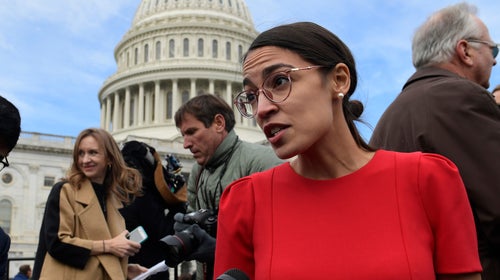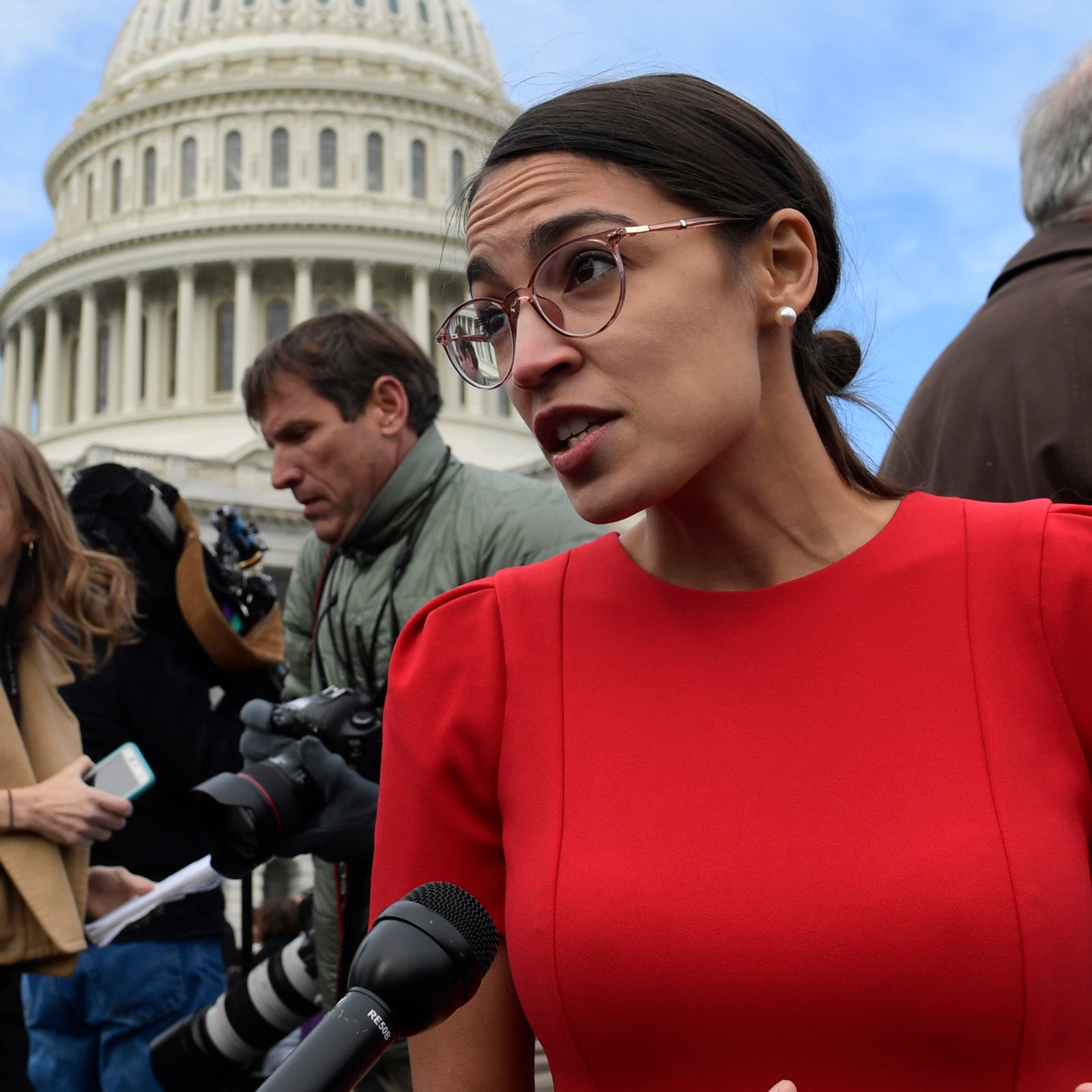When 27-year-old climate activist Evan Weber thinks about climate change, he thinks about his childhood in Hawaii. He spent those years in the mountains, on beaches, and in the ocean. ‚ÄúNow the beaches that I grew up on don‚Äôt exist anymore,‚ÄĚ he says. ‚ÄúSea-level rise . The mountains are green for much less of the year. The from ocean acidification killing both marine life and surf breaks.‚ÄĚ
That’s what brought him, on November 13, to march on soon-to-be House Majority Leader Nancy Pelosi’s Capitol Hill office with around 150 other activists from a progressive group he cofounded called Sunrise Movement. They were demonstrating for a sweeping policy plan championed by congresswoman Alexandria Ocasio-Cortez called . It is pitched as an economy-wide climate mobilization to connect environmental, social, and economic policies through legislation and would create everything from investment in federal green jobs for all who want them to a massive green-infrastructure program. The end result would be an overhauled national economy run on 100 percent renewable energy.
While these are lofty goals, and many of the plan’s feasibility, advocates see it as setting the bar for a sufficient response to climate change that politicians can be held to. And the proposal is in Washington, D.C., as a platform to rally around heading into 2020: more than 40 lawmakers have endorsed Ocasio-Cortez’s call for a congressional select committee to map out the Green New Deal. Many in the outdoor industry are also paying attention to what could be the best hope to save our ski seasons and protect our public lands.
‚ÄúIt‚Äôs an approach that‚Äôs so comprehensive that it could be a way for the United States to lead in the direction of stabilizing the climate at two degrees Celsius,‚ÄĚ says Mario Molina, executive director of the advocacy group . According to a climate assessment put out by the federal government last month, warming above that threshold (3.6 degrees Fahrenheit) before 2050.
Climate change is already impacting snowpack, and ski resorts across America are scrambling to adapt. This past year, Aspen Snowmass launched a political campaign called Give a Flake to get its customers engaged in climate action, Squaw Valley equipment in 2017, and Vail is pursuing its operations. But, Molina explains, there’s a long way to go to address the ski industry’s fossil-fuel-intensive operations. He believes that something like the economy-wide transition to renewable energy proposed in the Green New Deal is the best way ski resorts will be able to significantly lower their carbon footprints. It would allow them, for example, to hook their resorts up to a central power grid that would spin their lifts with renewable energy and create more sustainable transit options to and from the slopes.
Warming above that threshold (3.6 degrees Fahrenheit) could shorten ski seasons by half in some parts of the U.S. before 2050.
Amy Roberts, executive director of , also sees the opportunity to link this kind of large-scale climate action with the outdoor economy, especially when it comes to public lands. An economy powered on 100 percent renewables would obviously erase any incentive for fossil-fuel companies to drill in places like the Arctic National Wildlife Refuge and Bears Ears National Monument. But the OIA is still watching to see how the politics around the Green New Deal shape up. The early support from lawmakers is encouraging, but they‚Äôre mostly Democrats. Roberts insists that policies to protect the climate and public lands need bipartisan support, but she thinks that the outdoor industry can help make that happen. ‚ÄúWhen you look at who takes part in our activities, whether it‚Äôs hiking, camping, hunting, or fishing, there are both Republicans and Democrats,‚ÄĚ she says. ‚ÄúThat‚Äôs an opportunity to unite and bring a compelling message that‚Äôs separate and apart from what the environmental community is doing.‚ÄĚ
As proof, she points to the Georgia Outdoor Stewardship Act. In November, Peach State voters passed the measure, in which sales tax from sporting goods and outdoor equipment is used to fund parks and trails, with 83 percent support. In the same election, the governor’s race was so divided that it went to a recount.
Even with glimpses of bipartisan support for the environment, Molina worries that the main hurdle Green New Deal legislation will face is influence from the fossil-fuel industry. Its lobbyists to campaigns in the 2016 election, and in 2018 a Washington State ballot measure that would have added a modest carbon tax on emissions and used the revenue to fund environmental and social programs. Additionally, former oil lobbyist David Bernhardt was tapped to replace Ryan Zinke as interior secretary in December.
But activists like Weber are not giving up. As part of their push for a Green New Deal, they have called for members of the Democratic leadership from fossil-fuel interests. And a few weeks after Weber was in Nancy Pelosi‚Äôs office, he and more than 1,000 young people were back in Washington, D.C., this time storming Capitol Hill in a daylong push to get lawmakers to endorse the Green New Deal, an effort that resulted in nearly 150 arrests. They remain unfazed by claims that the plan‚Äôs goals are too large. ‚ÄúA Green New Deal is the only proposal put forth by an American politician that‚Äôs in line with what the latest science says is necessary to prevent irreversible climate change,‚ÄĚ Weber says. ‚ÄúIt could mean the difference between whether future generations around the world get to have the same formative experiences in nature that I did‚ÄĒor not.‚ÄĚ


